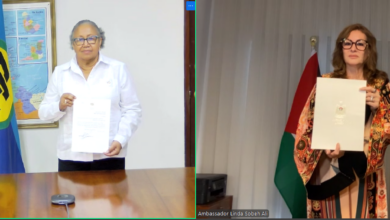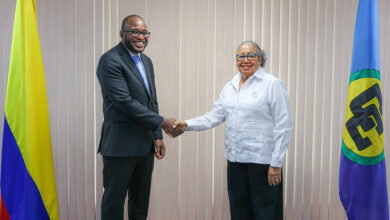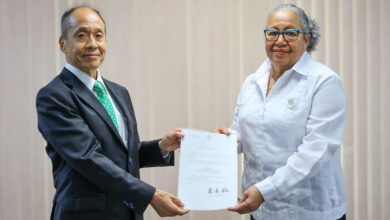Most Honourable P.J. Patterson, Prime Minister of Jamaica and Chairperson of CARICOM,
Distinguished Heads of State and Government of CARICOM
Your Excellencies: Ministers, Ambassadors and High Commissioners,
Delegates and friends
On behalf of the African Union and your brothers and sisters in Africa, I would like to thank you most sincerely for the privilege and opportunity you have given us to attend this 24th Regular Meeting of CARICOM, as well as join you as you celebrate the 30th Anniversary of CARICOM.
My delegation and I are also honoured and pleased to bring you the warm greetings and best wishes of the Government and the people of South Africa.
Nine years ago, our country, South Africa, was still governed by a white minority apartheid regime. But by then, we knew that freedom was in sight. We knew that many centuries of suffering were about to come to an end. We knew that the cause for which we had fought together would soon emerge victorious.
In ten months time, we will celebrate the 10th anniversary of our liberation from apartheid and white minority rule. We would be most honoured if you joined us in celebrating this historic event. I trust that you will accept this humble invitation, the very first invitation we issue to anybody in the world.
This is not accidental. You are the first citizens of the world we humbly invite, because of the central role you played in the struggle to end the evil system of apartheid, a system that was an insult to all African people in Africa and the Diaspora, a crime against all humanity.
The victory of 1994 was therefore as much ours as it was yours. Liberated South Africa is as much your home as it is ours.
What we will celebrate together, as we mark the 10th anniversary of that victory, will be the fact that despite the physical distance between the Caribbean and Africa, you nevertheless saw it as your duty to stand shoulder to shoulder with us as we fought for our emancipation.
What we will celebrate together will be the fact of the unity, solidarity and deep-seated friendship of the peoples of African descent in Africa, the Caribbean and elsewhere in the world.
Some of those who did not directly experience the pain of racial oppression doubted that we would ever emerge victorious. They thought our enemies were so strong and we were so weak, that it would take many generations before we liberated ourselves from tyranny.
Acting together, we proved them wrong. Together we demonstrated practically that brute force would never vanquish our determination to be free and fully human, equal to any other human being in the world.
Necessarily, as we meet here today to celebrate the 30th Anniversary of CARICOM, we must ask ourselves the question – What is the new order of the day? What new challenges confront us together, and what shall we do about them together?
Some of the answers to these question are not difficult to find. As elected leaders of our peoples, we know the conditions that define their lives. We know that millions of our people in Africa and the Caribbean are poor. We know that the scourge of underdevelopment afflicts all our countries.
We are perfectly conscious of the fact that we are subject to a process of globalisation that is contributing to an ever-widening gap between us, the have-nots, and others elsewhere who are rich, which results in the further global marginalisation of our countries and peoples.
We know that we are exposed to a global order characterised by a gross imbalance in the distribution of political, economic, social and military power. This gives some who are rich and powerful, the prerogative to be the decision-makers for all humanity. On the other hand, we who are poor and weak are expected to be nothing more than supplicants, who must petition the powerful to be merciful and charitable towards us.
But when we fought for our liberation from colonialism and apartheid, we never thought that our liberation would come about as a result of good-heartedness of those who were our oppressors. Before the independence of India, the late Sir Winston Churchill made this point very clear, when he said he was not elected Prime Minister of the United Kingdom to preside over the dissolution of the British Empire.
He was right. But, perhaps what he did not quite understand was that, the decision to dissolve the British Empire did not rest with him, but with millions in Africa, the Caribbean and Asia who were colonised and racially oppressed.
Today, the daily actions of those who are rich and powerful communicate the clear message that they think that problems of global poverty and underdevelopment are problems of the poor, and not theirs. In practise, they tell us that to get out of this condition, we must pull ourselves up by our boot-straps, oblivious of the fact that we are without boots and walk barefooted.
Surely, this tells us that as we were our own liberators from colonialism and apartheid, so must we be our own liberators from poverty and underdevelopment. The question we must answer is – What is to be done? How do we pull ourselves up without boot-straps?
I am certain that we are of one mind that one of the prerequisites for the victory we seek is our unity, in the same way that we united to defeat the apartheid system. As we observe the 30th Anniversary of CARICOM, we celebrate and salute the sustained effort of the people of the Caribbean to unite to confront their common challenges together. I am certain that we pledge ourselves never to waver in the pursuit of this goal, because we know that we will not achieve victory unless we are united.
Driven by this same realisation, your brothers and sisters in Africa took the decision to replace the Organization of African Unity with the African Union. In addition, they made the determination that they must bind themselves to a common development agenda, and therefore decided on the New Partnership for Africa’s Development, (NEPAD).
Distinguished leaders of CARICOM:
As your brothers and sisters across the Atlantic Ocean, we are aware of, and sincerely appreciate your concerns about issues of peace, stability, democracy, and human rights in Africa. I would like to assure you that we too are similarly concerned about these important matters and are attending to them with the necessary sense of urgency.
Only two days ago, on June 30th,, President Kabila announced the formation of a new and inclusive transitional Government of National Unity of the Democratic Republic of Congo that will lead this important African country to democracy. The leaders of the people of Zimbabwe are engaged in dialogue to find a solution to that country’s political, economic and social problems.
Burundi is on course, moving towards the day when its people will exercise their rights to elect their own Government, free of military rule. Work is progressing to constitute a peacekeeping force to end the civil war in Liberia and neutralise the elements that have brought instability to large parts of the region of West Africa.
We will not tell you lies and claim easy victories. We know that much remains to be done to build the kind of peaceful, democratic and prosperous Africa that you rightly want to see. But this I can say, that however difficult the road ahead of us, we will win.
To gain that victory, once more we need your support and involvement in the common effort. We have to deepen even further the spirit and practice of cooperation and solidarity between the Caribbean and Africa, between CARICOM and the African Union.
Together, we have the task to decide what we should do to engage one another in a practical way, to use our intellectual and material resources to confront the common challenges of poverty and underdevelopment in Africa and the Caribbean.
Our meeting here today, to celebrate the 30th Anniversary of CARICOM, therefore constitutes a commitment to ourselves that we will do everything we can, to elaborate the concrete measures we must implement to unite the peoples of the Caribbean and Africa in action for their mutual emancipation from poverty and underdevelopment. This includes our cooperation as we strive to define our place within the international community of nations.
The Second Ordinary Assembly of Heads of State and Government of the African Union will take place in Mabuto, Mozambique in a week’s time. One of the agenda items is to look at what needs to be done to strengthen the links between the African Continent and the African Diaspora. The Summit will also discuss the question of concrete measures we must implement to unite our peoples in action.
In this regard, we would be very happy to share our experiences with you, as you prepare to host the 2007 Cricket World Cup. I believe that our common objective must be that this tournament hosted by the people of the Caribbean, must be even better than the one that Africa hosted earlier this year.
We will leave Montego Bay, Jamaica the land of Marcus Garvey and other African heroes and heroines, and depart from the Caribbean, later today and return to Africa.
With your permission, we will tell your brothers and sisters across the Atlantic, that the leaders and peoples of the Caribbean are determined to intensify the struggle, acting together with the leaders and peoples of Africa, to ensure that our common dream for the renaissance of the peoples of African descent is no longer deferred.
We wish your meeting success. Hearty congratulations to CARICOM on its 30th birthday and many thanks indeed for your attention.





